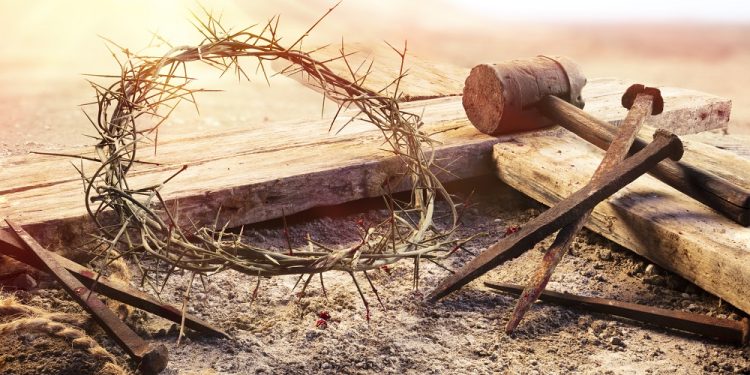
Good Friday
Observed mainly by followers of Christianity, Good Friday is a religious holiday that commemorates the crucifixion—and eventual death at Calvary—of Jesus Christ. This holiday is observed on the Friday before Easter Sunday, a date that sometimes coincides with the Jewish observance of Passover, although they don’t always overlap.
On this day, followers of Christ can reflect on the human sin that led to the death of Jesus Christ and repent for it. They can also reflect on the ultimate sacrifice made by Jesus—an act he performed to ensure that we were all absolved of our original sin. This holiday is known by several different names, including Great Friday, Holy Friday, and Easter Friday.
Biblical Accounts of Good Friday
According to the accounts in the Gospels of the Bible, Jesus Christ was arrested by royal soldiers in the Garden of Gethsemane. Judas Iscariot received thirty pieces of silver for betraying Jesus and marked him for arrest by the guards by kissing him.
After he was arrested, Jesus was taken to the house of Annas, which belonged to the father-in-law of the high priest, Caiaphas. After the interrogation bore little fruit, Jesus was then sent bound to Caiaphas the high priest.
As many witnesses testified, with some conflicting with one another, Jesus answered none of the questions posed to him. Finally, the high priest urged Jesus to respond under oath and tell the court whether he was the Son of God.
Jesus’ response was ambiguous, and he told them, “You have said it, and in time you will see the Son of Man seated at the right hand of the Almighty, coming on the clouds of Heaven.” This angered the high priest, and he condemned Jesus for blasphemy. The Sanhedrin agreed with this, and the sentence of death was passed on to Jesus.
The next morning, Jesus was brought to the Roman governor Pontius Pilate under charges of making himself a king, subverting the nation, and opposing taxes to Caesar. Pontius Pilate gave authorization to the Jewish leaders to judge Christ according to their own laws and penalties.
However, the Jewish leaders replied that it wasn’t lawful for them to put any man to death. Pontius then questioned Jesus and told the assembly that there wasn’t a basis for him being sentenced in this court. He learned that Jesus was from Galilee, so he referred the case to King Herod, the ruler of Galilee.
King Herod was available because he was in Jerusalem for the Passover Feast. After Herod questioned Jesus and received no answers in return, he sent him back to Pilate. Pontius Pilate asked the chief priests what should be done with Jesus, and they demanded that he be crucified.
Pontius’ wife had a dream about Jesus the night before, and she advised him to have nothing to do with Jesus. Pilate went ahead and had him flogged in anticipation of his eventual release, but the crowd demanded that Jesus be sentenced to death for his claims that he was the Son of God.
Pilate went before the crowd, declared Jesus innocent, and then washed his hands with water to show that he didn’t take part in Jesus’ condemnation. As the crowd grew rowdy, Pilate eventually handed Jesus over to be crucified to prevent a possible riot. The sentence was that Jesus was to be carried to the cross where he would be executed. This place was called Golgotha in Hebrew, Calvary in Latin.
Jesus was then crucified along with two convicted criminals. Jesus lay on the cross for six hours, and he asked God why he had forsaken him. Jesus then let out a loud cry and gave up his spirit. The body of Jesus was taken by Joseph of Arimathea and wrapped in a clean linen shroud. His body was then placed in a new tomb that had been carved into the rock. Jesus was then buried according to Jewish burial customs, and a large rock was rolled over the entrance of the tomb.
Customs, Traditions, and Observations on Good Friday
Religious Observations
Good Friday is treated in the Roman Catholic tradition as a fast day—a day in which one only has one full meal and purposefully abstains from meat consumption. As a result of this practice, many churches hold Fish Friday or Fish Fries, as they’re more commonly known, where parishioners can congregate with one another and eat a non-meat meal.
There usually aren’t any Catholic liturgical rites between Holy Thursday and Easter Sunday, but there are special exceptions to that rule. For example, if one is in imminent danger of death, then they may be administered the rite of Baptism. They may also partake in Penance or an Anointing of the Sick. There is, however, a Good Friday liturgy in the Roman Catholic tradition that includes Holy Communion, a Veneration of the Cross, and a Liturgy of the Word.
In Lutheran tradition, this is considered one of the more important holidays. On this day, Lutherans are supposed to abstain from the works of the world, although over the past few years, this stance has been relaxed somewhat. For some Methodist denominations, Good Friday is observed with fasting, a service of worship that’s based upon the Seven Last Words of Jesus from the cross, as well as a liturgy known as the Three Hours Devotion.
The Three Hours Devotion begins at noon and concludes at 3 pm. The 3 pm time is chosen to indicate the time of Jesus’ death on the cross. In the Moravian Church, an agape feast—otherwise known as a Lovefeast—is held on Good Friday.
Other Customs Related to Good Friday
Good Friday is considered to be a public holiday in dozens of different countries—particularly ones that have a strong tradition in the Christian faith. This holiday isn’t a federal holiday in the United States, however, although some U.S. states do treat it as a state holiday. States that treat Good Friday as a state holiday include Kentucky, New Jersey, Texas, and Hawaii.
In some places, there’s a custom called the Black Fast that’s observed until 3 or 6 pm. Also known as a strict fast, this ancient form of Christian fasting requires the participant to consume no food throughout the day. They are, however, allowed to drink water during this time. The fast is then broken with prayer and a meal that doesn’t contain meat, other animal products, or alcohol.
In Australia, Good Friday is a holiday in all states and territories. Most shops, except for the ones in the Australian Capital Territory or Northern Territory, are required to remain closed for Good Friday. However, there are exemptions and certain circumstances that allow a shop in these areas to remain open on this day. In Canada, this holiday is a federal statutory holiday, and employers in Quebec can choose to give their employees either Good Friday or Easter Monday off.
In the U.S., the stock markets are closed on Good Friday, but the bond trading and foreign exchange are open for part of the business day. Some public schools are closed on this day, not because it’s Good Friday, but because it’s in the middle of spring break. On the federal level, banks and federal offices remain open for the day.








